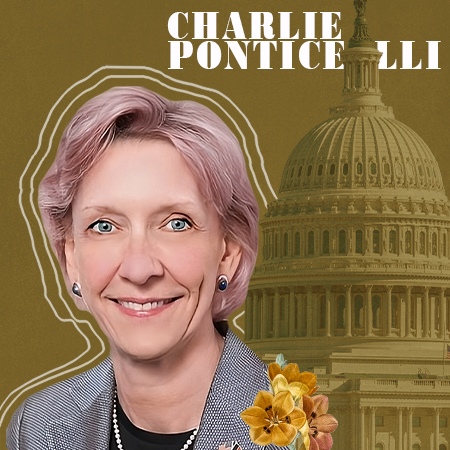CATEGORIES
People We Admire | Social Impact | Women EmpowermentOverview:
- Growing up with five siblings shaped Charlie Ponticelli’s passion for women’s empowerment and other humanitarian causes.
- Driven by personal experiences, Charlie Ponticelli has been devoted to human rights causes and bridging connections with people throughout my career, focusing on issues like human trafficking, girls’ education, women’s entrepreneurship, and fighting corruption.
- Balancing personal and professional life involves making sacrifices, building strong support systems, and embracing opportunities with love.
1. Tell us about your childhood and how your experiences shaped who you are today.
Growing up with five siblings in rural Pennsylvania and later Maryland, the idea of women empowerment was always within me.
I followed my heart through college, majoring in Spanish literature. These days, people often overlook passion for practicality but I’ve learned that if you put your talents to good use and follow your heart, you can achieve remarkable things, especially when you’re driven by a desire to make a difference in the world.
From a little girl climbing trees to becoming a Spanish literature major, I’ve been fortunate to land some incredible jobs. I have served in roles like Senior Coordinator for International Women’s Issues at the State Department and head of the International Labor Affairs Bureau at the US Department of Labor. These assignments led me to represent my country in places like the UN in Geneva and other international fora and to feel a profound sense of awe and possibility.
Gratitude has always been my guiding principle. I’ve treated each opportunity I’ve had as a gift, knowing that my role as a political appointee depended on elections and the goodwill of those who hired me. I always felt obligated to do my best, recognizing that I worked for the American people whose taxpayer dollars funded my position.
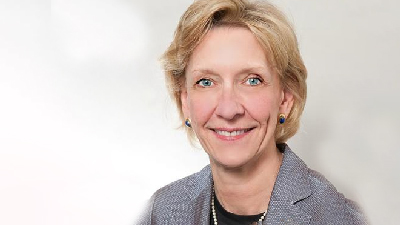
2. Is there any particular experience that drives your interest in human rights causes, and how do you see it as something that could make a difference?
I have had an incredible journey, and I’ve learned that the most challenging jobs are often the most rewarding. Working closely with a former Cuban political prisoner, Armando Valladares, introduced me to human rights causes. Seeing the human faces behind policies fuels your drive to make a difference.
Over the years, I’ve been involved in various causes, from human rights in Cuba to the situation of abused sugarcane workers in the Dominican Republic to advocating for Afghan women and girls. The cycle of denial of education, primary healthcare, and employment in countries like Afghanistan underscores the importance of our work.
I’ve seen atrocities and challenges in countries like the former Yugoslavia, Afghanistan, Iraq, Kuwait, Egypt, and the Dominican Republic. These experiences have left an indelible mark, reminding me that every action matters, even as we enjoy everyday comforts like sugar in our coffee.
I owe much of my success to the support of incredible men who believed in me and provided opportunities when there were only a few women in high positions. Men were my first mentors, and I worked hard to repay their faith in me.
I’ve also spent the past nine years volunteering in prison ministry in Baltimore, working with Spanish-speaking inmates. It’s been an eye-opening experience, reminding me we’re more than our past actions and mistakes. Seeing the human side of individuals facing hardships has deepened my commitment to human rights and the power of connection.
In the end, it’s the connection with others that makes our work truly rewarding. Whether it’s advocating for change on a global scale or reaching out to inmates in a federal prison, understanding and compassion can bridge even the deepest divides.
3. Tell us about the specific mentors you’ve had and the influence they’ve made in your life.
I remember bringing home my report card when I was in the third grade. My father looked at it and said, “If you work hard enough, there’s no limit to what you can do.” It was men like my father who gave me the encouragement to work hard and who supported me along the way.
Max Friedersdorf was the head of the Senate Republican Policy Committee when I worked there as a research writer. I had no background in Congressional Affairs and legislative affairs, but when they asked me to submit a writing sample, I did and I got the job. I just worked as hard as I could. Each job will give you skills. For me, the language skills proved invaluable later on.
Working on Capitol Hill in my 20s, I received an unexpected offer from my boss one day: a chance to work at the White House. The prospect seemed incredible, and I eagerly accepted despite the caution that the job required 24/7 availability. Weekends and holidays were not exempt; I had to be ready whenever duty called. I then went on to serve as Congressional Liaison for Latin America at the US Agency for International Development and to become the mother of two boys (my best development project ever!).
After having my boys, I eventually felt the need to return to work and called Ken Duberstein, who was then serving as President Ronald Reagan’s Chief of Staff. He assured me that he would see what he could do and asked me to fax him my resume, the standard procedure at the time. As if making that phone call wasn’t challenging enough, it was doubly hard with two little ones clamoring for my attention on the other side of the door! Somehow I managed to complete the call after distracting them with some crackers that I had deliberately placed in the hallway to keep them busy.
Thanks to Ken’s referral, I secured a position at the US Department of State, where my boss was Rich Williamson, Assistant Secretary of International Organization Affairs. Rich had a wonderful impact on my life, giving me the opportunity to become involved in the cause of global human rights, which has remained my passion and my calling ever since.
That’s a succession of men who have guided me. In those days, during my first “tour” at the State Department, you could go to a meeting and discover that you were the only woman, or maybe one of only two women in the room. But by the time I returned to the State in 2002, women were running the meetings, and these were impressive women who were definitely making a difference!
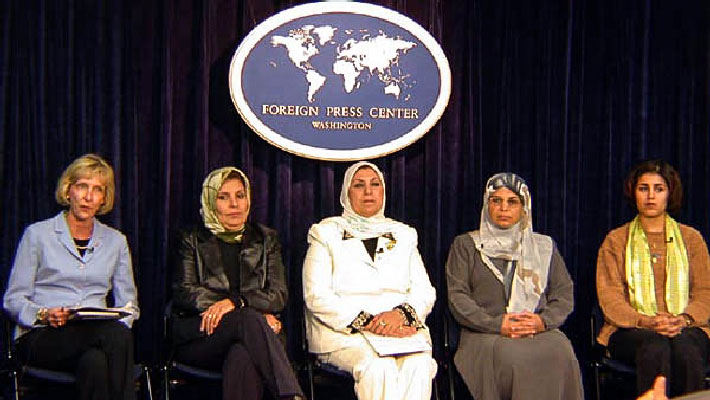
4. Which career role have you enjoyed the most in your journey?
I’m a bit stubborn, but I’ve always been an optimist. Life can throw curveballs, but I’ll keep swinging. One of the roles that I enjoyed most was serving as Deputy Undersecretary for International Labor Affairs at the US Department of Labor.
What really got me pumped about the job was the teamwork. We were an International Bureau in a domestic agency. I had a great portfolio with three divisions — trade and labor affairs; international relations; and tackling human trafficking, forced labor, and child labor. The latter was crucial and something that drove me. I’ll also always be grateful for the way the Labor Department job opened my eyes to the importance of workforce development—the ability to gain knowledge, skills, and economic opportunity—when it comes to addressing basic human rights and humanitarian needs.
5. Where, in your view, does change start? In a country, like Afghanistan, is the change happening from a policy perspective or people on the ground?
The first time I met a group of Afghan women was at a literacy center in Kabul funded by the United States. The room was basic; just a bare floor with no furniture except for an old cast iron stove in the middle to keep us warm. There were women of all ages, from 16 to their 60s, gathered around that stove. I learned more in that single meeting than I ever would from the policymakers.
Their stories were incredible. Some were learning to read and write, while others were working on rugs that their husbands sold in Pakistan. One woman, making sweaters, said, “See, every one of us here knows how to do something,” and that hit me hard. The knowledge and commitment these women had were truly inspiring. So, when you’re trying to help people on the ground, you take your inspiration to the decision-makers, those with the ability to translate policies into programs that can truly make a difference.
It’s about having the courage to stand by your convictions. Real change happens when the people in power see your commitment to making a difference. So, you listen to the people, learn from them, and let that guide your conversations with those in leadership. That’s how you turn convictions into action.
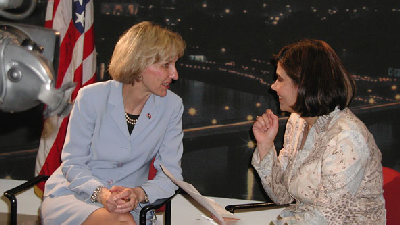
6. How do you balance your personal life and professional life?
People often asked me this question during my time at the State Department’s Office of International Women’s Issues. I would meet women from different countries, and it was surprising how frequently one of my peers from another country would ask how I balanced it all. We all have to figure out the balancing act and it wasn’t always easy for me. I wanted to have a family, a career, and do a lot more, which was really tough. For many years, I used to commute from Baltimore to DC—about an hour on the train each way.
Sometimes, especially when my kids were small, I’d get home, and they’d already be asleep. I’d want to cry. I’d often find myself torn between, “I have to go watch my son’s baseball game,” and “I have to do something urgent for work.” There was one year when my younger son was five and the other seven years old, and I was asked to go to Geneva for six weeks with the US Ambassador to the UN Human Rights Commission. Leaving my two boys behind with my husband for such a long time was one of the hardest things I ever did. I regretted having to make that choice, but it was an amazing experience, albeit a challenging one.
I think when we’re trying to make a difference, we’re willing to sacrifice. You need your team, your husband, parents, grandparents, or, in my case, incredible women friends who would help care for and pick up my children.
Women tend to excel at creating strong support systems. It’s just a unique ability we have. So, how do you balance it all? You find a way. As Antonio Machado said, “You make your way by walking.” You just do it and inspire your children in turn.
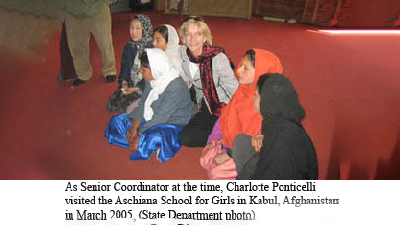
7. What advice would you give young professionals looking to build a successful career and create a soft-selling path?
I always see every opportunity as just that – an opportunity. It might not be the dream job or exactly what I imagine or want for myself at that point, but life’s a journey. I have always wanted to keep moving forward and not get stuck doing something that wasn’t fulfilling. If you want to make a difference, you can find a way to do it, and I often remind myself of this.
I’m a fan of collecting quotes, and one that really sticks with me is something Mother Teresa once said, “We can’t all do great things. But we can all do small things with great love.” It’s a beautiful reminder that even our relatively small acts of service for others can turn into something truly great when done with genuine love. So, let’s embrace those small things and do them with all the love we’ve got – you never know how big an impact they might have.
Conclusion:
Charlie Ponticelli’s journey is a testament to what one can achieve through passion and persistence. Through all her different roles in life, she comes back to the same idea for life: small acts of kindness and love matter in creating a positive impact on the world.

